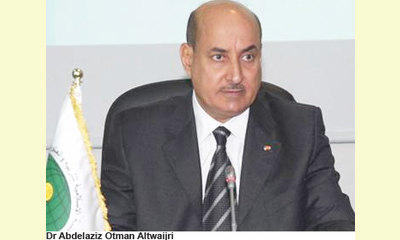|
|
The Director-General of ISESCO pleads for world peace and defends multi-culturalism
un article par Le Temps, Senegal
Dr Abdulaziz Othman Altwaijri, Director General of
the Islamic Educational, Scientific and Cultural
Organization (ISESCO), launched Friday in Baku
(Azerbaijan), a call for the preservation of world
peace and promoting "multiculturalism in human
societies."

Dr Abdelaziz Otman Altwaijri
click on photo to enlarge
"The respect and preservation of multiculturalism is
a human right [...] and a pillar on which is based
the security, peace and stability of the world,"
said Mr. Altwaijri, at the second international
humanitarian Forum of ISESCO.
"The cultures and civilizations of the world are
different, but they all converge to common and
fundamental human values that can entrench the
principles of international law," he said in a
speech at the meeting that was forwarded to the APS.
He recalled: "The United Nations Charter, the
Universal Declaration of Human Rights, the
International Covenants and opinions from the
International Court of Justice are all common
human values that have their sources in the
cultures and civilizations that have succeeded
each otherthroughout history. "
"Multiculturalism is, therefore, the richness of
the system of international law, the guarantee of
security against deviation from the supreme
principles of this system and the common heritage
of civilizations, which continues to be enriched
through the ages" he said.
He expressed the wish, as recommended by the
General Conference of UNESCO in 2005, that "all
mankind [works] improve the world," to "promote
dialogue between cultures and alliance of
civilizations," but also to "spread the culture of
peace and justice in the service of
multiculturalism."
(Click here for a French version of this article)
|








|
DISCUSSION
Question(s) liée(s) à cet article:
In what voice or voices can Islamic heritage speak to us today,, yet relevant to our technically advanced but morally turbulent world?
* * * * *
Commentaire le plus récent:
And here are important excerpts from Shirin Ebadi's Nobel Prize lecture. . .
"Allow me to say a little about my country, region, culture and faith.
I am an Iranian. A descendent of Cyrus The Great. The very emperor who proclaimed at the pinnacle of power 2500 years ago that "... he would not reign over the people if they did not wish it." And [he] promised not to force any person to change his religion and faith and guaranteed freedom for all. The Charter of Cyrus The Great is one of the most important documents that should be studied in the history of human rights. . ... continuation.

|
|









